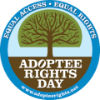This morning I got up early to move my car out of the driveway so my wife could get her car out to go to work. After switching the cars around, I turned on the television. It came on to NBC and the Today show. They were discussing the case of Carlina White, a woman who had been stolen from the hospital when she was born. She had reunited with her biological family after 23 years (she had discovered the truth only when she asked her "mother" for her birth certificate).
After the initial happy reunion, Carlina has become distant from her biological family and has apparently inquired about money that her parents received in a settlement with the hospital. She has even gone back to the name she was raised with.
The Today show interviewed her biological mother. It was rather brief and perhaps superficial, though it didn't have the "gotcha" qualities you might expect on a daytime talk show. It was a difficult story to watch, sad and perhaps a bit too familiar.
As I watched, I began thinking about what others would think. How many people would connect this with adoption? Would they see the emotional ups and downs that Carlina is clearly going through as resonating with many adoptees?
I doubted it. After all, it wasn't an adoption but a kidnapping. And there are allegations that she was abused. Thus we have an easy explanation for why she is now behaving the way she is. She was raised in a bad situation, by people who didn't really love her. The popular view of adoption would suggest that if she had been raised in a loving home, things would be fine now. Thus there is no take-away for adoption in this story.
That's the narrative. That's what our society believes. We have made a concerted attempt to de-stigmatize adoption. It's not just that families formed by adoption are just as good as families formed by biology; we seem to need to believe that there are no differences between the two.
Adoptees who are troubled by aspects of their history are thus no different than other children who grew up in troubled homes. Such adoptees must have something wrong with them. Either their adoptive parents did not do right by them somehow, or something happened in utero to screw them up. Most adoptees are perfectly well-adjusted with no issues at all surrounding their adoption.
Again, that's the narrative.
That's what needs to be changed. It is not my intent to re-stigmatize adoption. It is not my intent to speak for all adoptees. Everyone's experiences are going to be unique. But there are a lot of commonalities among many adoptees. And it speaks to the complexity of adoption and the feelings it may provoke from those who experience it firsthand.
We would like adoption to be a simple good. It solves a problem of providing children with a home, and we want to believe we have done right by those children. Understanding the complexities of adoption requires challenging that simplistic view of the situation.
For the sake of all adoptees, we need to change the narrative. Not to pathologize adoptees. Not to stigmatize adoptees. Not to treat adoptive parents as somehow less worthy. But to recognize that there are issues and complexities that many (though perhaps not all) adoptees (and parents, both biological and adoptive, as well as other family members) will have to deal with.
We are arranging families. We can sugar-coat that however we like. We aren't stealing babies the way that Carlina was stolen. But we are taking a child from one family and grafting it into another. If we aren't willing to face up to the possible repercussions of that, we ought not do it at all.
It's time to change the narrative. It is well-entrenched, however, and it will take time. Still, we owe it to every child we claim to do this for.
Tuesday, February 8, 2011
Subscribe to:
Comments (Atom)

